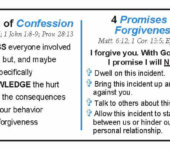The Advantage of Healthy Conflict in Business
May 29, 2018
In the May Round Table meetings, we discussed “The Advantage of Healthy Conflict in Business.”
Dealing with conflict in the workplace can be a daunting task, but it doesn’t have to be. At our recent Leadership Event, Rodger Price, Owner & Founder of Leading By DESIGN, laid out the steps to dealing with the “#1 Communication Challenge: Leaning into Healthy Conflict.” If you were unable to attend, subscribe to our YouTube channel here where you can review all past Leadership Event presentations. Be sure to turn on your notifications so that you are the first to know when Rodger’s presentation is available.
Below are the notes from the May Round Table meetings.
Birmingham Round Table
Challenge:
- Conflict can be disruptive
- Takes people out of status quo
- Teams – people bring different ideas, uncomfortable
- How you will be perceived if you have a different viewpoint
- If there is no leader to help refocus the group
- Takes time to manage.
Solution:
- Need to build acceptance of different ideas into your culture
- Need a culture of trust and respect for everyone’s opinion
- Need to “walk the culture talk”
- Understanding that if you don’t “win” you must respect final decision
- Make expectations clear
Takeaway:
- Culture plays a big role in supporting healthy conflict
- Take your time and you will be effective
- LEAN can be applied to any business (not just manufacturing)
- Ask three questions before you start to solve
- “A Factory of One” by Dan Markovitz
Kalamazoo Round Table (Tuesday)
Challenge:
- We’re often afraid of hurting someone’s feelings, but we have a responsibility to help resolve any issues – accountability to ourselves and to the team.
- Compounded conflict – the issue at hand and the way of addressing it.
- Getting the right verbiage: “difference” of opinion vs. “conflicting” opinions. The latter sounds more combative.
- Looking at each conflict with fresh eyes. Don’t assume.
- Understanding the difference between responding and reacting.
Solution:
- Must have trust. Trust is vital to conflict resolution.
- Eliminate fear from the organization.
- Address any fear that may be contributing to the conflict. It may be something small to you, but big to them.
- Accountability.
- Address an issue soon so that it doesn’t fester and cause a blow up.
- Help your team to see the importance of addressing an issue.
- Must have discernment:
- Wait and assess the situation.
- Sometimes the argument is not the source of the conflict. May be a deeper issue.
- Ask questions. Wait to hear all sides of the story.
- Make it a process.
- Q: Do you ever want to introduce conflict into a situation?
- It can teach you lessons personally or about your work environment.
- Allow the person who created the conflict to grow by pursuing and enacting a resolution.
- Emphasize learning from other’s mistakes, but teach them how to learn from their own.
- Use external examples to relate to internal conflicts. May allow your team to see the situation with fresh eyes and soften the blow.
Kalamazoo Round Table (Thursday)
Challenge:
- Conflict with leadership vs. conflict with employees.
- Being blunt vs. asking questions.
- Confrontation requires truthfulness.
- We are often afraid to confront someone because we worry that the problem lies with us. “Is it me?”
- It is not the content, but the delivery that matters. One can deliver points, but in the wrong way.
- The difficulty of technology. Comments can easily be misconstrued via phone, text, and email.
Solution:
- Q: What is Healthy Conflict?
- Discussion of ideas
- Constructive
- Facts and Data vs. Emotions
- Confrontation is just a different form of communication.
- Conflict is good in a competitive environment. It can help you come to a better solution/idea.
- Avoiding conflict can cause it to reach a boiling point.
- Address the person causing the conflict and avoid gossip.
- Don’t ambush. State why you are there.
- Approach as discussion and not as a lecture.
- Balance your response:
- Tell them something positive before the negative.
- Don’t connect your positive and negative comments with “but.” Connect your comments with “and.”
- Wait to respond when emotions are high.
- No better way to gain respect and authority than by addressing conflict in the workplace in a healthy and respectful way.
Kalamazoo Round Table (Friday)
Topic: “The Advantage of Healthy Conflict in Business”
Challenge:
- Conflict:
- creates tension & compression
- helps people get better
- Engages people – when asking for input/insights
- Removes obstacles/barriers when resolved
- Creates an opportunity to learn something
- Not everything may get worked out
- Matthew 18
- Where 2 or 3 are gathered, there will be conflict
- Conflict should come with a humble perspective (humility)
Solution:
- Crucial Conversations training
- Not promoting fear-based leadership/conflict
- Lean into healthy conflict – there’s a cultural foundation required to allow this to go right and it’s about how leaders handle situations
- Need an environment of trust, feedback, accountability
- Don’t gossip/let conflict fester before it becomes more emotional than it needs to be
- Go straight to the source
- Speak truth in love – peacemaking card
- Handle it timely and right away
- Practice using role playing techniques
- 3 Components that promote healthy conflict:
- Trust
- Commitment to Excellence
- Show you care
- Take “Conflict Styles” assessment – https://www.usip.org/public-education/students/conflict-styles-assessment.
- Match emotion with emotion & fact with fact or resolve with resolve
- Seek to understand the other person’s emotion / perspective to connect logically, not emotionally
Take Away:
- Always seek to resolve – bring individual values together to build the relationship value
- Ask “how do we feel about that?” more often
- Good leaders listen and let others have the answers
- Celebrate failures – it’s about what you learned, not always about success
Join us next month as we discuss the “Keys to Business Survival & Success: What Are They & What Role Does Responsiveness Play?” RSVP to info@thebusinessrt.org.

